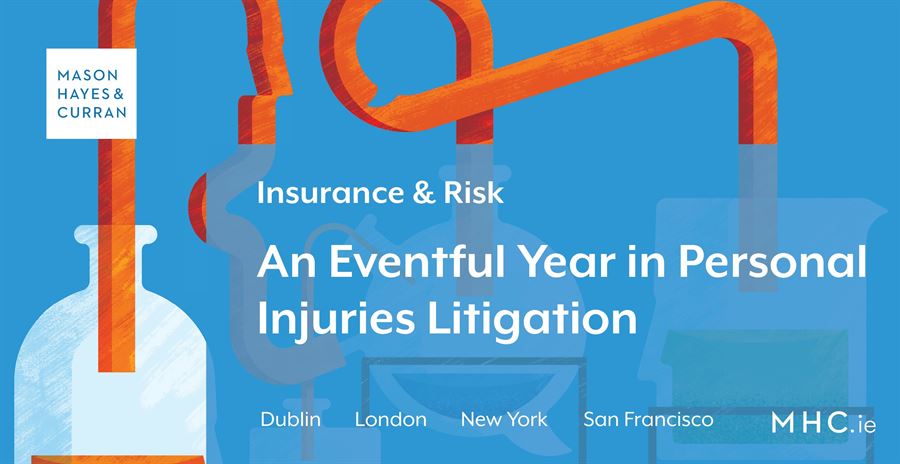
2019 saw some exciting developments from the courts. Commentators have observed that this year may signal a tipping point in the culture of claims we have seen in recent years. The changing tide will offer some comfort for those vigilant employers and occupiers who have worked hard to ensure compliance with their statutory obligations. Insurers can also be cautiously optimistic.
Ripple effect of the Court of Appeal’s decisions felt in High Court only?
The Courts Service 2018 annual report, published in July 2019, notes a 29% reduction in the average High Court award made in 2018.
Former High Court President Nicholas Kearns has commented that although the Court of Appeal has had the effect of “recalibrating” the level of awards being made by the High Court, the effect of these rulings has not being seen at Circuit and District Court levels.
In contrast to the High Court, the average Circuit Court award rose from €18,488 in 2017 to €19,304 in 2018. Given that the Personal Injuries Commission found last year that the average soft-tissue award in Ireland was more than four times that in the UK this is an area which requires review.
A review of this kind may come in the form of the newly established Personal Injuries Guidelines Committee of the Judicial Council, although Chief Justice Frank Clarke has stressed that it is for the Committee itself to decide the scope of its work and how it will be carried out. Seven judges have now been appointed to the Committee with Ms Justice Mary Irvine of the Supreme Court appointed as the Chairperson. It remains to be seen whether the Committee’s work will lead to a downwards recalibrating of personal injuries awards in Ireland.
 Duty, Negligence and Causation – the wheels of justice are turning more fairly
Duty, Negligence and Causation – the wheels of justice are turning more fairly
Throughout 2019 the courts have shown an increased willingness to recognise that plaintiffs have a responsibility for their own safety, building on the momentum first sparked in 2017 with the decision in Byrne v Ardenheath [2017] IECA 293.
In Reilly v Mangan [2019] IEHC 91 a plaintiff was held wholly responsible for his own injury for engaging in behaviour that put his own safety and the safety of others at risk. The plaintiff was drunk and engaged in a fight on a busy street. During the altercation, he fell to the ground near the back wheel of the defendant’s taxi which was caused to roll over his ankle when he pulled away in traffic.
In Keegan v Sligo County Council [2019] IECA 245 the Court of Appeal sent the plaintiff’s case back to the High Court for a new hearing on liability as the High Court decision had, amongst other things, failed to consider whether the plaintiff’s alcohol intake was a contributing factor in his fall.
In the last few weeks, the Court of Appeal in White v Doherty & Anor [2019] IECA 295 upheld a High Court decision dismissing the plaintiff’s claim for damages after a trip and fall at a caravan park. The plaintiff had claimed negligence arising from the state of the ground. Both courts found users of the park would be expected to take care of any trip hazard that might exist because of loose or embedded stone.
Plaintiffs have been reminded in 2019 that even where a defendant is found to have breached their statutory duty, a court will not automatically attribute liability and will explore whether the breach was in fact causative of the damage the plaintiff suffered. In McCarthy v Twomey [2019] IEHC 719, the court accepted the defendant homeowner had breached their statutory duty under the Safety, Health and Welfare at Work (Construction) Regulations 2013 in not appointing a project supervisor to adopt a health and safety plan for persons on site but went on to find that breach did not cause the plaintiff’s accident.
Courts Examine the Role of Experts and Solicitors in Personal Injury Actions
In the cases of O'Connell v Martin and Ali v Martin [2019] IEHC 571, both on appeal from the Circuit Court, Mr Justice Twomey in the High Court examined the practice of solicitors referring their clients for specialist medical evaluation in the absence of a referral from the client’s primary treating doctor.
Mr Justice Twomey stated:
‘A key factor undermining the claims made by both plaintiffs is that, contrary to what this Court would regard as the usual practice of a GP referring a patient to a consultant, it was a solicitor, with no medical expertise, who referred both Ms O’Connell and Mr Ali to a consultant, for their alleged injuries in order to progress these claims”.
The courts continued that a referral of this nature by a solicitor was a ‘legal need to support a claim for damages’.
The High Court has also made comments in relation to other expert evidence. In the case of Donnelly v Dunnes Stores [2019] IEHC 347, engineering evidence came under review when Mr Justice Twomey advised that ‘although experts are supposed to be completely independent and owe a duty to the Court, more often than not, expert opinions will correspond favourably with the interests of the paying client.’
The above is further confirmation that the courts are continuing to interrogate the way personal injuries actions are conducted by both sides.
Comment
The changing landscape will be a welcome development for all defending parties not least employers who have felt the pressure of standard almost akin to strict liability when defending claims made by employees. The courts are holding plaintiffs to a higher standard in the presentation of their cases and there is an increased pressure on plaintiffs’ solicitors to ensure their client’s claims of negligence can withstand a deeper interrogation. Even in the event a plaintiff succeeds in proving a breach of duty on the part of the defendant they still must show a causal link before damages will be awarded.
For information on the changing landscape of personal injury law in Ireland, contact a member of our Insurance & Risk team.
The content of this article is provided for information purposes only and does not constitute legal or other advice.






